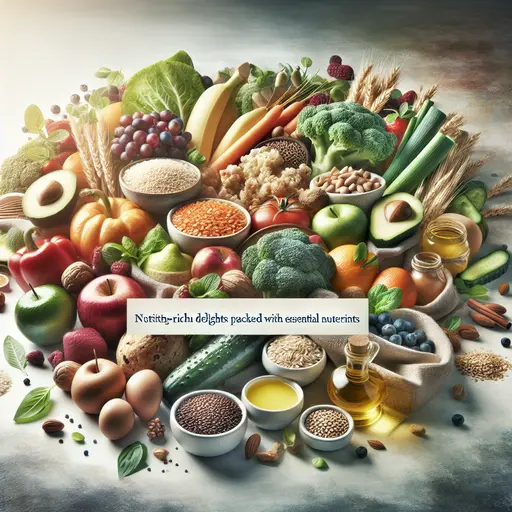Carbohydrates Unwrapped: Exploring Healthy Sources for Energy
Unwrap the mystery surrounding carbohydrates and explore healthy sources that can fuel our bodies. Understand why our bodies need carbs and how to choose the right ones.

Carbohydrates, fondly known as carbs, are often the center of hot debates in the health and wellness world. Some diets vilify them, cutting them out entirely, while others embrace them as the holy grail of energy sources. The truth, as with many things, lies somewhere in the middle. So, let's unwrap the mystery surrounding carbohydrates and explore some healthy sources that can fuel our bodies.
What are Carbohydrates?
Carbohydrates, often simply referred to as 'carbs', are organic compounds that consist of carbon, hydrogen, and oxygen atoms in specific ratios. They are one of the three primary macronutrients found in the foods and drinks we consume, sitting alongside proteins and fats in our dietary intake.
They play a crucial role in our body's proper functioning as they are primarily used as a source of energy. When we ingest carbohydrates, our body works to break them down into simpler sugars that are then used to fuel our cells, tissues, and organs.
Not only are carbohydrates essential for energy, but they also contribute to other functions. For instance, they help regulate the body’s use of other macronutrients and form protective structures around cells. They also serve as the backbone of genetic materials, such as DNA and RNA.
Carbohydrates can be found in a wide variety of foods, from grains and vegetables to fruits and dairy products. However, it's important to remember that not all carbs are created equal. There are two main types: simple carbohydrates, such as those found in processed foods and refined sugars, and complex carbohydrates, which can be found in whole grains, fruits, and vegetables.
The Comprehensive Guide to the Different Types of Carbohydrates
Carbohydrates, an essential part of our daily diet, are typically categorized into three main types: sugars, starches, and fibers. These classifications are based on their distinctive chemical structures and the rate at which the sugar they contain is absorbed and digitated by the body.
Sugars: These are the simplest form of carbohydrates, often referred to as simple carbohydrates. They are rapidly absorbed into the bloodstream, providing a quick source of energy. These naturally occur in a variety of foods such as fruits, vegetables, milk, and milk products. In addition to their natural occurrence, sugars can be added to foods in various forms like granulated sugar, honey, molasses, and syrups, and unfortunately, can be found in many processed foods. It is crucial to be aware of your sugar intake, as too much can potentially lead to health issues.
Starches: On the other hand, starches are known as complex carbohydrates as they are composed of many sugar units bonded together. Due to their complex structure, starches take a longer time to break down, resulting in a more steady and sustained release of energy. Starches are found in a variety of foods including beans, peas, lentils, and grains, making them an excellent source of energy for the body.
Fibers: Similar to starches, fibers are also classified as complex carbohydrates. However, the human body cannot fully break down most fibers. Therefore, fiber largely passes through the body undigested, playing a key role in digestion and aiding in the prevention of constipation. Foods that are high in fiber include fruits like apples and bananas, vegetables such as broccoli and Brussels sprouts, whole grains like oats and brown rice, and legumes like lentils and chickpeas.
In conclusion, understanding the different types of carbohydrates and their roles can help people make healthier dietary choices. However, it's important to remember that moderation and balance are key in any diet. Carbohydrates are a crucial component of a balanced diet, but like anything, they should be consumed in moderation.
Why Do We Need Carbohydrates?
Carbohydrates often receive a significant amount of negative press, leading many to ask: why do we need carbohydrates? The answer to this question is simple, yet expansive. Carbohydrates are, in essence, the primary fuel for our bodies. They are our body's preferred source of energy, acting as the powerhouse for all our activities, which includes everything from the most strenuous physical exercise to the simplest of tasks.
Perhaps the most significant function of carbohydrates is their role in powering our brain. The brain, unlike other organs, relies heavily on glucose—a type of carbohydrate—for its energy needs. Without an adequate supply of carbohydrates, our cognitive functions, including memory and concentration, may experience a noticeable decline.
However, it's crucial to understand that not all carbohydrates are created equal. Some carbs, often referred to as "good" or "complex" carbs, are more beneficial for our health than others. These types of carbohydrates—typically found in foods like whole grains, legumes, and fruits—also provide a wealth of other nutrients, including fiber, vitamins, and minerals.
On the other hand, "bad" or "simple" carbs—found in sugary drinks, pastries, and other highly-processed foods—offer little nutritional value. They are quickly digested and can lead to a spike in blood sugar, hence, it's advisable to consume them in moderation.
The key takeaway here is that while carbohydrates are essential for our bodies, it's the type of carbohydrates we consume that truly matters. Thus, a balanced diet that includes an appropriate amount of good carbohydrates is recommended for maintaining overall health and well-being.
Healthy Sources of Carbohydrates
Choosing the right sources of carbohydrates can drastically contribute to your overall health and wellness. Not all carbohydrates are created equal, and it's important to understand which types can provide you with the necessary nutrition without compromising your health. Here are some healthy sources of carbohydrates that you should strongly consider incorporating into your daily diet for optimal health benefits:
- Whole Grains: Whole grains, such as brown rice, oatmeal, and whole wheat bread, are excellent sources of complex carbohydrates. These foods are high in fiber, which aids digestion and can help manage weight. They also have a low glycemic index, which means they won't spike your blood sugar levels.
- Vegetables: While all vegetables provide carbohydrates, some pack more of a punch than others. Root vegetables like sweet potatoes and beets are particularly high in carbs. However, they also contain vital vitamins and minerals. Leafy greens and cruciferous vegetables, although lower in carbs, are packed with nutrients and should also have a place in your diet.
- Fruits: Fruits are not only a healthy source of sugars but they also provide essential vitamins and minerals. Citrus fruits, berries, and apples are among the best choices. They're high in vitamin C and fiber but lower in carbs than some other fruits.
- Beans and Legumes: Beans and legumes are an excellent source of fiber, protein, and carbohydrates. They are a great addition to any meal, providing a balanced blend of essential macro and micro nutrients. Popular options include lentils, chickpeas, and black beans.
Remember, when it comes to carbohydrates, it's not just about the quantity, but the quality. Opt for whole, unprocessed foods to get the most nutritional bang for your buck. It's also important to balance your carb intake with healthy fats and proteins. This way, you can ensure your body gets a wide range of nutrients, and you'll feel fuller and more satisfied after meals. By incorporating these healthy sources of carbohydrates into your diet, you'll be fueling your body with the energy it needs to thrive, while also supporting your overall health.
Unhealthy Sources of Carbohydrates
Carbohydrates - often referred to as carbs - are a critical component of a healthy diet. They provide our bodies with the energy we need to carry out our daily activities. However, not all sources of carbohydrates are created equal. While many foods high in carbs are undeniably healthy and beneficial, there are also sources that are quite unhealthy and can negatively affect our overall well-being. These sources are typically found in foods that are heavily processed or artificially enhanced.
Take for instance foods like white bread, pastries, and other highly-processed foods. These products often contain what are known as refined carbohydrates. These types of carbs have been stripped of their natural fiber and other vital nutrients during the manufacturing process, resulting in a product that is high in calories but low in nutritional value. The excessive consumption of these foods can cause blood sugar levels to spike and then rapidly crash, initiating a cycle of hunger and cravings for more sugar. These cravings can easily lead to overeating, weight gain, and potentially to more serious health conditions such as diabetes and heart disease.
It's worth noting that not all processed foods fall into this category. There are some that can still be part of a healthy diet. However, foods that contain refined carbohydrates - such as those mentioned above - should ideally be consumed in moderation, if at all.
Understanding the difference between healthy and unhealthy carbs can make a big difference in your diet and overall health. Always aim to choose foods that are rich in complex carbohydrates, like whole grains and fresh fruits and vegetables, over those loaded with refined carbs.
Conclusion
Carbohydrates are a crucial part of our diet, providing us with the energy we need to go about our day. Choosing the right sources of carbohydrates can help maintain energy levels, support brain function, and keep our digestive system running smoothly. So, next time you're planning your meals, remember to include some healthy carbohydrates.
🌿
Category: Nutrition & Diet
Join the community
Related Articles

The Importance of Fiber in Your Diet
Fiber - the unsung hero of our diet. We often think about pr...

The Ultimate Guide to Healthy Eating: A Path to Better Living
Healthy eating is not just a diet; it’s a lifestyle. By ma...

Nutrient-Rich Delights: Healthy Foods Packed with Essential Nutrients
As we journey through life, our bodies serve as our vessel, ...
Latest Articles

The Role of Minerals in Rock Formation
Welcome to another enlightening article on HeavenRelax.com, ...

The Importance of Patience in Our Life
In this fast-paced world we live in, patience is often seen ...

Importance of Patience in Customer Service
Are you ever lost for words when a customer complaint spiral...
Comments
No comments yet. Be the first to comment!